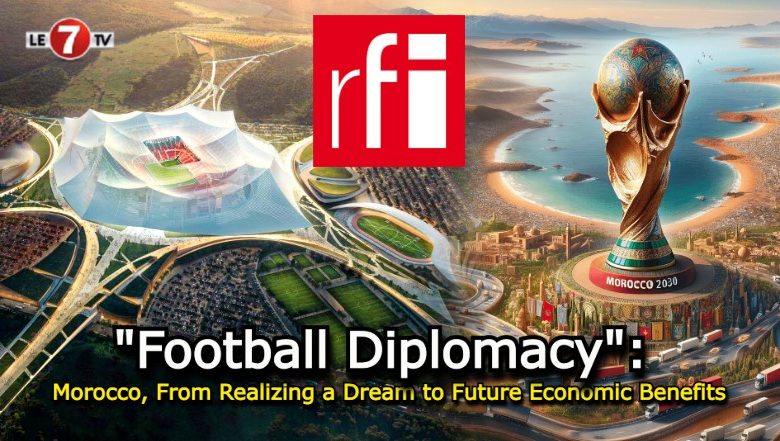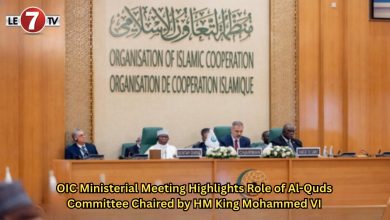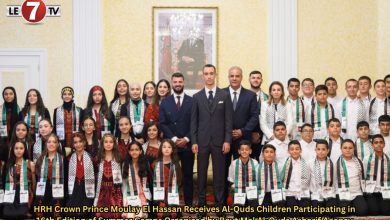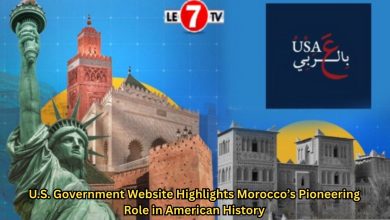“Football Diplomacy”: Morocco, From Realizing a Dream to Future Economic Benefits

Morocco, designated as a co-host for the 2030 edition, is set to realize its dream of organizing a World Cup – an opportunity for the Kingdom to develop its economy and expand its influence through “Football Diplomacy,” wrote Radio France Internationale (RFI).
As a future co-organizer of the 2030 World Cup with Spain and Portugal, the Kingdom has demonstrated perseverance. As the first African country to bid for the 1994 edition, Rabat subsequently endured multiple failures – four more times – notably losing out on the 2010 World Cup to South Africa, a heartbreak at the time.
Three decades of frustration will officially be put to rest on Wednesday when FIFA approves the joint bid by the three nations, the only dossier retained by the global football body. Morocco is already eagerly anticipating the multiple benefits it seeks to reap.
This World Cup represents “a unique opportunity to accelerate the dynamics of economic growth (…), create more job opportunities, and enhance tourism appeal,” commented Fouzi Lekjaa, President of the 2030 World Cup Committee, during a recent ministerial council chaired by the King.
Morocco, a country of 38 million inhabitants, recorded a growth rate of 2.8% and an unemployment rate of 13.6% by the third quarter of 2024, according to official figures.
Looking ahead to the 2030 World Cup, Rabat has grand ambitions, with numerous projects planned, including “the expansion and renovation of airports in the six host cities,” “strengthening road infrastructure,” and “developing hotel and commercial facilities,” according to a statement issued after the council meeting.
A Final in “Casa”?
A testament to this ambition, alongside upgrading six stadiums in Rabat, Casablanca, Fez, Tangier, Marrakech, and Agadir, the Kingdom does not intend to let Spain or Portugal claim the prestige of hosting the tournament’s final. Morocco’s trump card? The construction of a 115,000-seat stadium in Benslimane, near Casablanca, with a budget of 480 million euros.
Yet Morocco’s ambition extends beyond the economic sector alone. While the World Cup infrastructure “will serve as a legacy,” the North African nation has understood the importance of sport in promoting its image, notes sports policy researcher Moncef El Yazghi.
This perspective is shared by Abderrahim Bourquia, a sociologist specializing in sports sciences, who believes that co-hosting the World Cup will also “associate Morocco with the so-called ‘positive’ values of sport, quality of life, and confidence,” at a time when the Kingdom seeks to further expand its influence, particularly on the continent.
A historically open country, especially towards Europe, Morocco has shifted its focus over the past decade towards sub-Saharan Africa, launching numerous investments and significantly reinforcing its presence there.
Since its return to the African Union in 2017 – an institution it left four decades earlier over the Western Sahara dispute – “we have witnessed football diplomacy directed towards African nations,” highlights El Yazghi. He points to the 44 partnership agreements signed with African football federations in recent years.
Although a major event was missed in 2015 – due to an Ebola outbreak on the continent – Morocco will host the Africa Cup of Nations (AFCON) in 2025, after having organized the women’s tournament in 2023, as well as several editions of the Club World Cup.
A Favorable Context
Moreover, the Kingdom believes that organizing the World Cup comes at a diplomatically favorable moment, as several countries – including Spain – have recognized its sovereignty over Western Sahara, a territory it largely controls but which is contested by the Polisario Front, supported by Algeria.
The agreement between Rabat and Madrid has “certainly paved the way for joint reflections on hosting the World Cup,” notes international relations expert Tajeddine El-Husseini.
To top it off, Morocco’s sporting prospects are also bright. Since 1986, when the Atlas Lions made history by reaching the second round of the Mexican World Cup, the national team has grown, culminating in their groundbreaking 2022 performance in Qatar – becoming the first African and Arab nation to reach the semi-finals.
However, there remains room for growth in Moroccan football, which has only 90,000 registered players, according to Moncef El Yazghi.
Beyond the growing excitement surrounding the World Cup, the Moroccan Football Federation (FRMF) launched a partnership with global phosphate giant OCP in August to finance training centers for professional players.
This initiative aims to shape the next generation of stars like Yassine Bounou, Achraf Hakimi, or Hakim Ziyech – heroes of Morocco’s recent World Cup run in Doha.
By the Editorial Team/Le7tv





